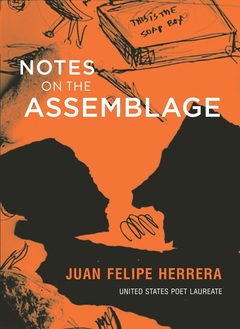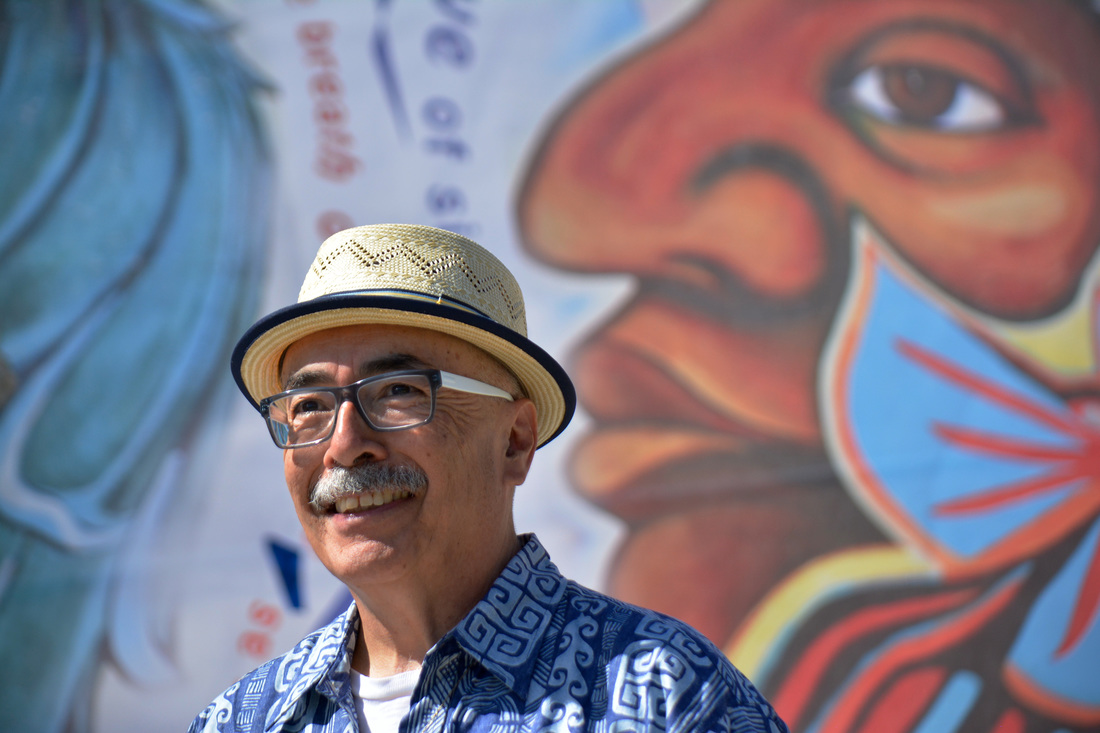At the beginning of the month, I went to the J.C.C.S.F. to see Juan Felipe Herrera. He read a number of poems and spoke about his experiences growing up being a campesino in southern california and journey as a poet. He described traveling up and down California and through many other states to speak up about injustices against minorities and workers and also just to share his personal voice. My favorite thing he said was I think from one of his poems, “Find a place to save your life”. This line to me perfectly describes his style because he blends and breaks so many barriers in form and in just basic life concepts. In that line he connects location, safety, and suicide all in one sentence. " -Pablo Gomez

After the event he had a book signing in the lobby. I bought his book Notes on the Assemblage (which I’ll talk talk about in a moment) and got in line. I planned and revised what I would say to him over and over while I waited. It was finally my turn and I asked him if he knew my father. He had mentioned that he went to political meetings at the Mission Cultural Center in the 80's in one of his speeches and I remembered that one of my brothers told me a few weeks back that our dad used to do the same thing as a union representative. Through a bit of describing it turned out that he may have known him. Juan asked me how he was doing and I revealed that he had passed away three years ago. But I was more happy than sad at that moment because for a while I had felt that I was missing a piece of my Mexican heritage and culture when he was gone but in discovering more about him, it felt like that piece was starting to reconstruct itself.
Juan asked me if I had written anything about him and I told him that I had written a small chapbook on him as a school project at my arts school, OSA. He wanted to see it and get in touch with me later on. And by now I was getting the “celebrity jitters” so when he asked me that I was like “You, the US poet laureate, want to read MY work. No way.” Eventually I sent it to him and he said he liked it. He could’ve been just been being nice but I think it’s still cool. From that moment on I’ve been taking myself a little bit more seriously and have signed up to participate in more literary events to put myself out there and maybe score some opportunities.
But his influence didn’t stop there. That night after the event I started reading the book from earlier, Notes on the Assemblage. I opened it up to the table of contents and read the titles of the poems and one immediately stuck out to me. It was a poem called “Half-Mexican” and since I’m Half-Mexican and half-Puerto Rican, of course I’m going to get excited.
The thing is, the more I read the poem, the more I interpret it as a poem that's not about being literally half Mexican rather it’s more about the feeling of being mestizo. ¨It is Mexican too, yet it is formless, it is speckled with particles. European pieces?” In this line the mestizo half is the the formless part with particles of European. I remembered one time when I was watching this youtube video of these Mexican kids getting harassed by a racist white guy. When I scrolled down to the comments section, another guy was saying that most Mexicans are mestizos and that they can’t tell them to go back to Europe because they were also from European decent.
I think of it as like if an american with a German ancestor didn’t identify with the Nazis. As a mestizo myself, I don’t identify with the conquistadors and how they forced themselves on native women. So that line “You are Mexican. One half Mexican the other half Mexican, then the half against itself.” reminded me how being mestizo can be almost shameful or used against you and this book has helped me to keep being me and to keep fighting regardless of what I am.
I actually got the opportunity to contact and ask him some questions regarding himself and his writing.
Pablo: Who / What motivates you to continue your writing?
Juan:I am motivated by people who suffer.
P:Has your writing style changed in correspondence to big political events like the Freddie Gray shooting or the Chicano Movement? If so, how?
J:My concerns have become now focused on the human condition... These are very hard times for most of us. Words are powerful and can help.
P:What do you see when you look at today’s youth? What do you see in us? What is our fate?
J: Youth - tremendous energy and minds - just need to apply them to the well being of those in bad shape and to see the big picture. Fate is what you make.
Thank you, Juan Felipe Herrera, for your passion and dedication to your art and community. I'm very grateful to have spoken with you. From the moment I walked up to you, I felt as though you really cared about me and what I had to say. It's been a great pleasure to delve into the world(s) of your poetry. I look forward to reading more of your work.


